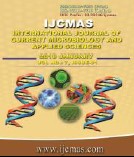


 National Academy of Agricultural Sciences (NAAS)
National Academy of Agricultural Sciences (NAAS)

|
PRINT ISSN : 2319-7692
Online ISSN : 2319-7706 Issues : 12 per year Publisher : Excellent Publishers Email : editorijcmas@gmail.com / submit@ijcmas.com Editor-in-chief: Dr.M.Prakash Index Copernicus ICV 2018: 95.39 NAAS RATING 2020: 5.38 |
Rice is one of the most important staple foods among the cereal crops for half of the human population. Unlike other cereals such as wheat and barley, rice plants are susceptible to cold stress, which causes decrease in productivity, especially in regions where the indica subspecies is cultivated. Low temperatures can have direct impacts on rice plants during germination, vegetative growth, and reproductive stages. This study aims to identify a suitable technique to estimate rice (Oriza sativa L.) cold tolerance at the germination stage and identify the variability among 30 rice genotypes. Cold tolerance was evaluated by two methods: in method I, rice seeds were kept and germinated under two conditions; 28 days in 13°C and seven days in 28°C; in experiment II, seedlings were kept at 72 hours 96 hours at 13°C and again 72 hours at 28°C. In experiment I percentages of reduction in radicle and coleoptile length and germination percent and percent decline in germination were measured. In experiment II coleoptiles growth radical regrowth after the cold period were measured. Results showed that low temperature effects in both experiments were varied among studied genotypes. Highest germination was achieved in SKAU-402 fallowed by SI-6, K-332, SI-5 and SI-3 with less percent decline in germination that is, 0.13, 0.17, 0.24 and 0.32 at 13ºC. Percentage of coleoptiles growth by low temperature (13ºC) was varied from 13.8 to 86.6%. In experiment II, radicle regrowth values varied from 2.0 to 12.0 mm, and SI-6,-SI-5, Kamad, SKAU-402 and K332, were the genotypes with high radicle regrowth.
 |
 |
 |
 |
 |